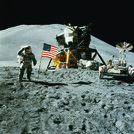
- Subject:
- Social Science
- Material Type:
- Module
- Author:
- OpenStax College
- Date Added:
- 07/18/2021

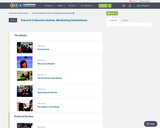
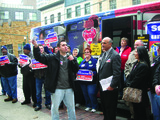
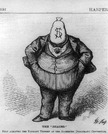
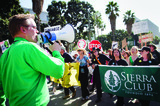
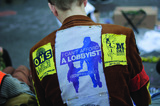
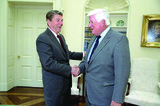





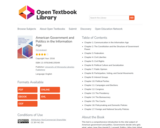
This text is a comprehensive introduction to the vital subject of American government and politics. Governments decide who gets what, when, how (See Harold D. Lasswell, Politics: Who Gets What, When, How, [New York: McGraw-Hill, 1936]); they make policies and pass laws that are binding on all a society’s members; they decide about taxation and spending, benefits and costs, even life and death.Governments possess power—the ability to gain compliance and to get people under their jurisdiction to obey them—and they may exercise their power by using the police and military to enforce their decisions. However, power need not involve the exercise of force or compulsion; people often obey because they think it is in their interest to do so, they have no reason to disobey, or they fear punishment. Above all, people obey their government because it has authority; its power is seen by people as rightfully held, as legitimate. People can grant their government legitimacy because they have been socialized to do so; because there are processes, such as elections, that enable them to choose and change their rulers; and because they believe that their governing institutions operate justly.Politics is the process by which leaders are selected and policy decisions are made and executed. It involves people and groups, both inside and outside of government, engaged in deliberation and debate, disagreement and conflict, cooperation and consensus, and power struggles.In covering American government and politics, this text introduces the intricacies of the Constitution, the complexities of federalism, the meanings of civil liberties, and the conflicts over civil rights;explains how people are socialized to politics, acquire and express opinions, and participate in political life; describes interest groups, political parties, and elections—the intermediaries that link people to government and politics; details the branches of government and how they operate; and shows how policies are made and affect people’s lives.
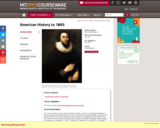
This course provides a basic history of American social, economic, and political development from the colonial period through the Civil War. It examines the colonial heritages of Spanish and British America; the American Revolution and its impact; the establishment and growth of the new nation; and the Civil War, its background, character, and impact. Readings include writings of the period by J. Winthrop, T. Paine, T. Jefferson, J. Madison, W. H. Garrison, G. Fitzhugh, H. B. Stowe, and A. Lincoln.
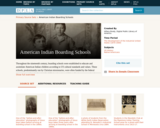
This collection uses primary sources to explore American Indian boarding schools. Digital Public Library of America Primary Source Sets are designed to help students develop their critical thinking skills and draw diverse material from libraries, archives, and museums across the United States. Each set includes an overview, ten to fifteen primary sources, links to related resources, and a teaching guide. These sets were created and reviewed by the teachers on the DPLA's Education Advisory Committee.
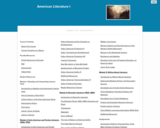
This course is a survey of American Literature from 1650 through 1820. It covers Early American and Puritan Literature, Enlightenment Literature, and Romantic Literature. It teaches in the context of American History and introduces the student to literary criticism and research.
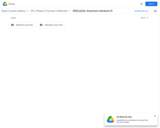
In this class we will practice skills in reading, analyzing, and writing about fiction, poetry and drama from a select sampling of 20th Century American Literature. Through class discussion, close reading, and extensive writing practice, this course seeks to develop critical and analytical skills, preparing students for more advanced academic work.
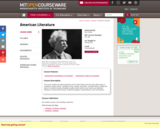
This course studies the national literature of the United States since the early 19th century. It considers a range of texts - including, novels, essays, and poetry - and their efforts to define the notion of American identity. Readings usually include works by such authors as Nathaniel Hawthorne, Henry David Thoreau, Frederick Douglass, Emily Dickinson, and Toni Morrison.
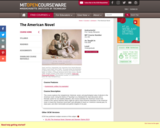
This course explores the metaphorical, historical, social, and psychological value of ghosts in the American novel. Using the theme of "haunting" as a flashpoint for class discussion and a thematic center for our readerly attention, this course examines the American novel in the context of the various histories which might be said to haunt fictional characters in the American novel, to haunt the American novel itself, and ultimately to haunt us: America's colonial past, its slave past, and other memorable and painful chapters in its past.
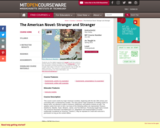
This course covers works by major American novelists, beginning with the late 18th century and concluding with a contemporary novelist. The class places major emphasis on reading novels as literary texts, but attention is paid to historical, intellectual, and political contexts as well. The syllabus varies from term to term, but many of the following writers are represented: Rowson, Hawthorne, Melville, Twain, Wharton, James, and Toni Morrison. Previously taught topics include The American Revolution and Makeovers (i.e. adaptations and reinterpretation of novels traditionally considered as American "Classics"). May be repeated for credit with instructor's permission so long as the content differs.